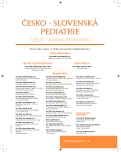Ethanol lock in the treatment and prevention of catheter sepsis
Authors:
F. Fencl
Authors‘ workplace:
Pediatrická klinika 2. LF UK a FN Motol, Praha
přednosta prof. MUDr. J. Lebl, CSc.
Published in:
Čes-slov Pediat 2015; 70 (6): 351-355.
Category:
Review
Overview
The increasing number of patients with long-term central venous catheters is associated with increasing frequency of their potential complications. One of the most severe complications is represented by catheter related sepsis.
This article describes etiology, diagnostic process and therapy of catheter related sepses. There are two main therapeutic options - extraction of catheter and systemic antibiotic treatment or systemic antibiotic treatment in combination with application of bactericide solution into catheter lumen - antibiotic lock (solution containing a high concentration of antibiotic with heparin) or ethanol lock (mostly 70% ethanol solution). Indications, contraindications, technical aspects of application and possible complications are described. It is concluded that combined therapy including systemic antibiotics and ethanol lock is safe, relatively simple and very effective treatment in therapy of catheter sepsis with the same or higher efficacy then in antibiotic lock treatment. Recently published data warrants the application of this treatment in the lowest age groups of patients in pediatrics and suggest its possible usage not only as a treatment, but also in the field of prevention of catheter sepses in patients with long-term catheters and with high risk of septic states.
Key words:
central venous catheter, catheter related sepsis, ethanol lock, children
Sources
1. Onland W, Shin CE, Fustar S, et al. Ethanol-lock technique for persistent bacteremia of long-term intravascular devices in pediatric patients. Arch Pediatr Adolesc Med 2006 Oct; 160 (10): 1049–1053.
2. Dannenberg C, Bierbach U, Rothe A, et al. Ethanol-lock technique in the treatment of bloodstream infections in pediatric oncology patients with broviac catheter. J Pediatr Hematol Oncol 2003 Aug; 25 (8): 616–621.
3. Jones BA, Hull MA, Richardson DS, et al. Efficacy of ethanol locks in reducing central venous catheter infections in pediatric patients with intestinal failure. J Pediatr Surg 2010 Jun; 45 (6): 1287–1293.
4. Howard L, Ashley C. Management of complications in patients receiving home parenteral nutrition. Gastroenterology 2003 May; 124 (6): 1651–1661.
5. Band JD. Treatment of intravascular catheter-related infections. UpToDate [online]. Aug 2015. Dostupný z: <http://www.uptodate.com//contents/treatment-of-intravascular-catheter-related-infections>
6. Mermel LA, Allon M, Bouza E, et al. Clinical practice guidelines for the diagnosis and management of intravascular catheter-related infection: 2009 Update by the Infectious Diseases Society of America. Clin Infect Dis 2009 Jul 1; 49 (1): 1–45.
7. Girand HL. Antibiotic lock therapy for treatment of catheter-related bloodstream infections. UpToDate [online]. Aug 2015. Dostupný z: <http://www.uptodate.com/contents/antibiotic-lock-therapy-for-treatment-of-catheter-related-bloodstream-infections>
8. Maiefski M, Rupp ME, Hermsen ED. Ethanol lock technique: review of the literature. Infect Control Hosp Epidemiol 2009 Nov; 30 (11): 1096–1108.
9. Chhim RF, Crill CM, Collier HK, et al. Ethanol lock therapy: a pilot infusion study in infants. Ann Pharmacother 2015 Apr; 49 (4): 431–436.
10. Oliveira C, Nasr A, Brindle M, et al. Ethanol locks to prevent catheter--related bloodstream infections in parenteral nutrition: a meta-analysis. Pediatrics 2012 Feb; 129 (2): 318–329.
11. Tan M, Lau J, Guglielmo BJ. Ethanol locks in the prevention and treatment of catheter-related bloodstream infections. Ann Pharmacother 2014 May; 48 (5): 607–615.
12. Pieroni KP, Nespor C, Ng M, et al. Evaluation of ethanol lock therapy in pediatric patients on long-term parenteral nutrition. Nutr Clin Pract 2013 Apr; 28 (2): 226–231.
Labels
Neonatology Paediatrics General practitioner for children and adolescentsArticle was published in
Czech-Slovak Pediatrics

2015 Issue 6
- What Effect Can Be Expected from Limosilactobacillus reuteri in Mucositis and Peri-Implantitis?
- The Importance of Limosilactobacillus reuteri in Administration to Diabetics with Gingivitis
-
All articles in this issue
- Influence of heel valgus on foot motion during walking in children aged 3–8 years
- Primary (autoimmune) sclerosing cholangitis in patient with inflammatory bowel disease
- Molecular genetics, phenotypic diversity and recent trends of personalized medicine in phenylketonuria
- Aspergillus fumigatus and cystic fibrosis lung disease – the overview
- Ethanol lock in the treatment and prevention of catheter sepsis
- Nicotine alters brain development
- Short-term foster care: psychological aspects
- Czech-Slovak Pediatrics
- Journal archive
- Current issue
- About the journal
Most read in this issue
- Primary (autoimmune) sclerosing cholangitis in patient with inflammatory bowel disease
- Nicotine alters brain development
- Influence of heel valgus on foot motion during walking in children aged 3–8 years
- Aspergillus fumigatus and cystic fibrosis lung disease – the overview
